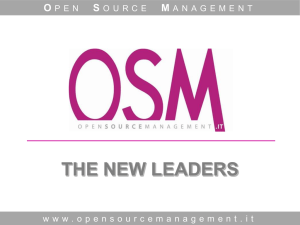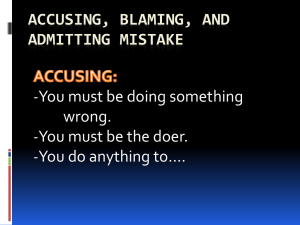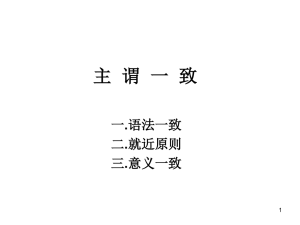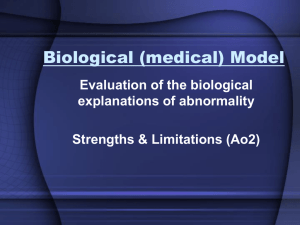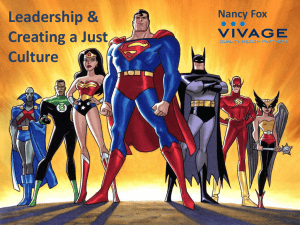The Cost of Blame
advertisement
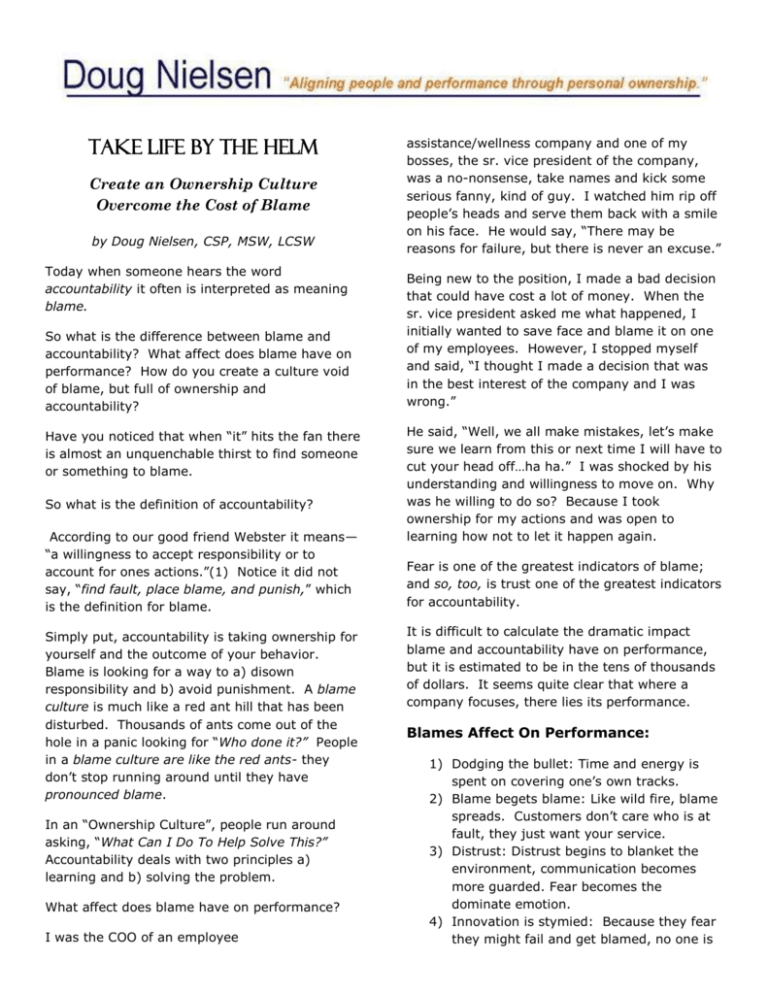
Take Life by the Helm Create an Ownership Culture Overcome the Cost of Blame by Doug Nielsen, CSP, MSW, LCSW Today when someone hears the word accountability it often is interpreted as meaning blame. So what is the difference between blame and accountability? What affect does blame have on performance? How do you create a culture void of blame, but full of ownership and accountability? Have you noticed that when “it” hits the fan there is almost an unquenchable thirst to find someone or something to blame. So what is the definition of accountability? According to our good friend Webster it means— “a willingness to accept responsibility or to account for ones actions.”(1) Notice it did not say, “find fault, place blame, and punish,” which is the definition for blame. Simply put, accountability is taking ownership for yourself and the outcome of your behavior. Blame is looking for a way to a) disown responsibility and b) avoid punishment. A blame culture is much like a red ant hill that has been disturbed. Thousands of ants come out of the hole in a panic looking for “Who done it?” People in a blame culture are like the red ants- they don’t stop running around until they have pronounced blame. In an “Ownership Culture”, people run around asking, “What Can I Do To Help Solve This?” Accountability deals with two principles a) learning and b) solving the problem. What affect does blame have on performance? I was the COO of an employee assistance/wellness company and one of my bosses, the sr. vice president of the company, was a no-nonsense, take names and kick some serious fanny, kind of guy. I watched him rip off people’s heads and serve them back with a smile on his face. He would say, “There may be reasons for failure, but there is never an excuse.” Being new to the position, I made a bad decision that could have cost a lot of money. When the sr. vice president asked me what happened, I initially wanted to save face and blame it on one of my employees. However, I stopped myself and said, “I thought I made a decision that was in the best interest of the company and I was wrong.” He said, “Well, we all make mistakes, let’s make sure we learn from this or next time I will have to cut your head off…ha ha.” I was shocked by his understanding and willingness to move on. Why was he willing to do so? Because I took ownership for my actions and was open to learning how not to let it happen again. Fear is one of the greatest indicators of blame; and so, too, is trust one of the greatest indicators for accountability. It is difficult to calculate the dramatic impact blame and accountability have on performance, but it is estimated to be in the tens of thousands of dollars. It seems quite clear that where a company focuses, there lies its performance. Blames Affect On Performance: 1) Dodging the bullet: Time and energy is spent on covering one’s own tracks. 2) Blame begets blame: Like wild fire, blame spreads. Customers don’t care who is at fault, they just want your service. 3) Distrust: Distrust begins to blanket the environment, communication becomes more guarded. Fear becomes the dominate emotion. 4) Innovation is stymied: Because they fear they might fail and get blamed, no one is willing to take a risk, and innovation is stymied. 5) Superficial communication becomes the norm, leaving real issues to fester and grow bigger. 6) Teamwork and problem solving are sluggish at best. It is impossible to solve a problem you refuse to take ownership for. Solutions come only once you own the problem or its impact on you. 7) Performance is stunted and true potential will never be realized. Start today to create a culture of ownership and accountability? 1) Be an example of the change you want. Take risks and be accountable for your behavior. 2) When mistakes happen, approach others with empathy, learning to improve. 3) Ownership begets accountability. Take ownership for yourself and watch accountability spread throughout your team. It is absolutely amazing and so refreshing when someone takes accountability. 4) Innovate and encourage others to do the same. Create a “safe” atmosphere for the team to share ideas. Fear of making a mistake is a clear indicator of a culture of blame. 5) Fail fast: It’s OK to fail, just do it fast, then learn, improve, and move on. 6) Allow yourself and others to be human. Be kind and keep things in perspective. 7) See blame as a neon sign indicating an opportunity to improve performance. 8) As a leader, be accountable to your employees first by serving them. Then and only then have you earned the right to hold them accountable. 9) Practice making decisions that are in the best interest of the business and you won’t stray far from your organization’s goals. 10) Hold people accountable they have made a commitment t you. 11) Be teachable and let go of your pride. 12) Remember that accountability applies for the positive as well. Recognize achievement, good decision making, and hard work. I have personally witnessed one person be the impetus for a cultural transformation. I invite you to be the One Person. Read this article with your team and discuss how you can increase ownership and accountability within your organization. (As an aside, the next time you hurt someone’s feelings, or are inadvertently thoughtless, try taking immediate ownership of the situation. Often we would rather be right than happy and we can always find an excuse or lame reason for why we did what we did. Yes, this takes practice and humility, but you will be amazed at how a disagreement that may have lasted 2 hours is over and done in 2 minutes! Try it.) Notes 1. http://www.merriamwebster.com/dictionary/accountability Copyright ©2011 Doug Nielse Doug Nielsen is a professional speaker, trainer, coach, and psychotherapist with over 17 years experience in aligning people with performance through personal ownership. He is also author of the recently released book, Take Life By The Helm: Proven Strategies For Gaining Immediate Control. To talk with Doug further about gaining the “Ownership Advantage” for your organization contact him at 801-391-4356 or doug@dougspeaks.com

